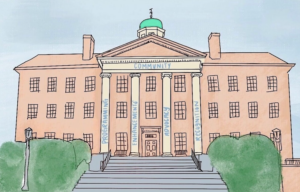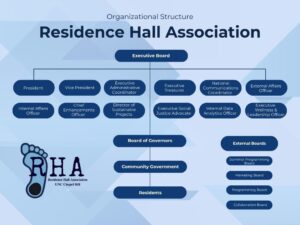About
The Residence Hall Association (RHA) was founded in 1973 to unify the various residential colleges and residence hall governments spread across campus under a single, consolidated organization. It has since grown into the third largest student organization on campus, possesses its own internal sources of funding, and maintains a strong, positive relationship with Carolina Housing. In recent years, RHA has streamlined its structure to create an efficient system that schools across the country seek to model. Among the many activities conducted by RHA are:
- Community and campus-wide programming

- Community Enhancements
- Appointments to various campus committees
- State, regional, and national residence hall conferences
All students living in university-managed residence halls and apartments, including Granville Towers, are members of RHA by virtue of their residency status. At present, approximately 9,500 students are members of RHA, with over 200 involved in direct leadership positions.
Mission Statement
“RHA stands for the Residence Hall Association and we represent the concerns of over 9,000 residents before the Administration of the University of North Carolina at Chapel Hill, provide diverse social, educational, and philanthropic programs within the residence halls, manage community enhancements, facilitate recognition of residence hall leaders, and foster a sense of community and belonging for all students at Carolina.”
Our Four Pillars
At the beginning of the 2010-2011 academic year, the Executive Board set out to determine the “core values” of the Residence Hall Association. These values were considered necessary to guide the deliberations of our organization’s leaders, and to ensure that all future decisions remained in line with RHA’s objectives. The product was a tribute to the university’s iconic Old Well. At the base is our mission statement, the strong foundation on which the organization rests. The columns represent the “four pillars,” or four areas in which RHA focuses its efforts—
- Advocacy
- Enhancements
- Programming
- Recognition
The four pillars support the overall goal of building a sense of Community, symbolized by the dome of the Old Well.
Our Three Primary Goals
- To represent residents’ concerns on those issues that affect them
- To build strong communities within residence halls through innovative social, educational, and service programs
- To provide enhancements in residence halls in order to foster a more comfortable atmosphere
Our Organizational Structure
RHA exists on three levels. First, each of the 12 residential communities on campus has a Community Government, which consists of officers and hall representatives who utilize funds collected through membership dues to organize community events of social, educational, and philanthropic orientation. In the past these have included programs such as tailgates before home football games, can food drives during Thanksgiving, and self-defense workshops. The success and diversity of these programs relies largely on the creativity of our student leaders, a characteristic on which our organization prides itself. Community officers also purchase and maintain residence hall Enhancements, which are items purchased by RHA that benefit residents in your community. The most commonly known and used RHA enhancements are cookware and recreational supplies.
These community officers are overseen by a community governor, whom is elected in August. The community governor oversees the activities of their government and serves on the Board of Governors (BOG), the chief legislative body of RHA. The BOG meetings are every Tuesday at 7:30 in the Student Union 3102. At these meetings, governors deliver reports on the activity in their communities and discuss issues concerning residential life. In addition, they hear appeal requests for program funding from outside organizations. The BOG then deliberates and determines whether or not to provide funding from RHA-at large for the event. It is the primary responsibility of governors in these meetings to speak and legislate on behalf of the residents in their community. To view the BOG minutes, click here!
Also present at these meetings is the Executive Board, the final tier of the organization. The Executive Board comprises the President, Vice President, Administrative Coordinator, Executive Treasurer, Internal and External Affairs Officers, National Communications Coordinator (NCC), Director of Sustainable Projects (DSP), Executive Social Justice Advocate, Wellness and Leadership Development Officer, Internal Data Analytics Officer, and the Chief Enhancements Officer (CEO). These twelve officers manage RHA at-large, including campus wide programming initiatives, collaborations with student government and other organizations, and relationships with the university administration. The president is elected in February of each year by all on-campus residents and takes office in April. He or she then appoints the other eight members of the Executive Board.




